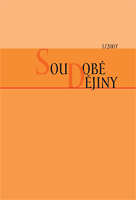Počátky exilové politiky Československé strany lidové: Adolf Procházka, Adolf Klimek a boj o Šrámkovo nástupnictví (1948–1953)
The Beginning of the Czechoslovak People’s Party in Exile: Adolf Procházka, Adolf Klimek, and the Struggle over Who Would Succeed Šrámek, 1948–53
Author(s): Drahomír SuchánekSubject(s): History
Published by: AV ČR - Akademie věd České republiky - Ústav pro soudobé dějiny
Summary/Abstract: This article traces the process of the organization of the Czechoslovak People’s Party and its programme in the fi rst six years in exile. It focuses on the power struggle and general relations among its leading figures and interest groups. The author points out that the victory of the Czechoslovak Communist Party (CPCz) in February 1948 meant a turning point for the People’s Party. Robbed of the opportunity to carry out its policy freely it henceforth worked in the country under a new leadership within the “revived” National Front as a satellite of the Communists. At the same time, however, a number of its members gradually joined in the resistance to the dictatorship, which often resulted in harsh repressive measures against them and the Party, and many of its pre-takeover functionaries and members left for the West. Similarly to the leaders and members of other democratic parties in exile, they built up a new party structure and tried to maintain continuity in their institutions and programme. These efforts were from the start, however, accompanied by internal disputes and competition amongst the individual would-be leaders. The intensity and persistence of the disputes were, argues the author, due to the fact that the People’s Party, unlike the other émigré parties, was without its chairman and leading party authority, Mgsr Jan Šrámek (1870–1956), who had been arrested while trying to escape Czechoslovakia. The People’s Party in exile soon began to split in two: on the one hand, the uncompromisingly anti-Communist right-wing critics of the idea of the National Front gradually created their own party platform; on the other, within the People’s Party in exile there was a struggle over the orientation of the programme, the leadership, and the senior members, which took place among factions around the general secretary of the party, Adolf Klimek (1895–1990), and the former minister of health, Adolf Procházka (1900–1970). The author discusses mainly the twists and turns of this conflict. Whereas Klimek represented the more traditional Christian-Socialist line in the spirit of Šrámek, the intellectual Procházka was inclined to modernize the party in the direction of the Christian Democrats. The balance of power between the two factions changed, but neither one gained the upper hand. The author argues that this situation very nearly paralyzed the People’s Party. It caused a great exodus of rank and fi le members, weakened the party’s position in the nonpartisan émigré institutions (like the Council of Free Czechoslovakia) and made it impossible to push through the priorities of its Christian political programme. Towards the end of the article, the author endeavours to look behind the “curtain of personal relations,” focusing on 1945–48 in order to elucidate the positions, alliances, and rivalries amongst the important political fi gures of the Czechoslovak People’s Party, which clearly continued in exile.
Journal: Soudobé Dějiny
- Issue Year: XIV/2007
- Issue No: 04
- Page Range: 651-681
- Page Count: 31
- Language: Czech

